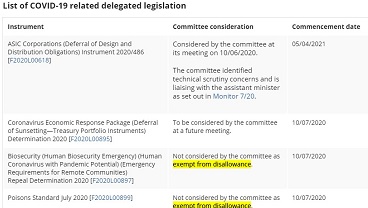In March and April when parliament operated in a reduced capacity due to the coronavirus outbreak, the government dramatically expanded its use of a number of measures typically used to reduce parliamentary oversight.
The Senate Standing Committee for the Scrutiny of Delegated Legislation, which had already “raised significant concerns about the increasing exemption of delegated legislation from parliamentary oversight” during a 2019 inquiry, in April 2020 launched a new inquiry into the increased use of various such legislative procedures deployed in response to the COVID-19 crisis.
According to the committee, delegated legislation “is law made by a person or body other than Parliament (such as the Governor-General or a minister), under authority granted to that person or body by the Parliament”. Usually, any member of the relevant parliamentary chamber can give a notice of motion to disallow the law within 15 days, whereupon the law is repealed. However, delegated legislation can be exempted from this process, preventing it from being disallowed.
The Senate Standing Committee for the Scrutiny of Bills made a submission to the new inquiry, which detailed three legislative tricks that are removing parliamentary oversight over lawmaking:
Exemptions
Bills can contain a provision exempting them from being disallowed, but there is a lack of guidance on what is required to justify such exemption under the Legislation (Exemptions and Other Matters) Regulations 2015. A submission to the inquiry from the Attorney-General’s Department declared that “disallowance is not appropriate in a number of cases including: where matters are appropriate for Executive control, where the proposed provisions are based on extensive consultation, scientific or technical considerations, and where government action needs to be decisive and certain.”
Examples of delegated legislation exempted from parliamentary oversight in 2020 include Advances to the Finance Minister, which allows the Finance Minister to allocate additional funds during the health crisis; and National Security Legislation, including new coercive questioning powers contained in the Australian Security Intelligence Organisation Amendment Bill 2020 (“Dutton moves to expand police state under cover of COVID-19”, AAS, 28 May).
There have been 219 pieces of delegated legislation implemented in response to COVID-19, so far. Of those, 45 were exempt from disallowance, many of which were instruments forming part of the Biosecurity Act. That’s over 20 per cent exempted. The Department of Home Affairs, in its submission to the inquiry, admitted that six of the seven instruments it has legislated to implement its pandemic response were exempt from disallowance.
Sunsetting
The committee also noted that “the Coronavirus Economic Response Package Omnibus Bill 2020 provided that a minister could defer the sunsetting date of both delegated legislation and primary legislation sunsetting before 15 October 2020 by up to 6 months”. Again, there is a lack of guidance on when this is appropriate, the committee observed.
Henry VIII clauses
The so-called Henry VIII clauses raised by journalist Karen Middleton in a 4 July article in the Saturday Paper, “Morrison ruling by ‘Henry VIII’ clauses”, take this a step further. As the committee explained, “A Henry VIII clause is a provision that enables delegated legislation to amend or modify primary legislation.” In other words, a new law passed by a single individual and often exempt from being disallowed, can have the effect of automatically changing another piece of legislation passed by the democratically elected parliament. Several of the COVID-19 response bills, reported the committee, have included “broad Henry VIII powers to amend a number of Acts” including the Corporations Act 2001 and social security legislation. Together with the rapid passage of bills, this all amounts to an incredible lack of limitations and safeguards, and “The committee considers that this has deprived Parliament of a crucial opportunity to have oversight of legislative changes being made during a period of emergency.”
By Elisa Barwick, Australian Alert Service, 15 July 2020







